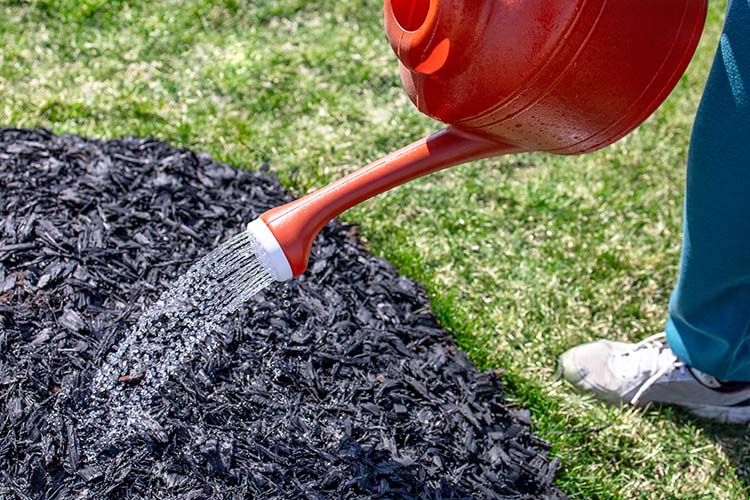A brief guide to the different types of mulch and which ones to choose if your lawn care business is going green.
Hey Clippers! Dave Tucker here to talk about something that only we lawn care business owners find interesting: mulch. Specifically, we’re continuing our series on eco-friendly lawn care business practices, which includes mulch.
I’m guessing you’re a mulch expert at this stage, so I won’t bore you with the basics. You know what mulch is for! Instead, we’re just going to talk about mulch from an environmental perspective.
If you’re thinking you’d like to take your lawn care business in a more sustainable direction, mulch matters. There are lots of different types out there, and not all of them will satisfy an eco-conscious customer. But it’s not as simple as “bark good, plastic bad.” The wonderful world of mulch has some unexpected quirks that do affect sustainability!
For our purposes, I’ve grouped your mulch options into three buckets: organic, dyed, and synthetic. Let’s talk about the sustainability of each one.
Organic mulch
Organic mulch refers to just about any time of mulch that’s made of natural materials. This includes bark chips, wood chips, nutshells, straw, pine needles, and even compost. Usually, your most eco-friendly mulches are going to fall into this category.
There are a few pros and cons to consider, starting with the environmental benefits of organic mulch. These materials are naturally occurring and biodegradable. They don’t introduce any new chemicals or contaminants to the soil or plant life. In fact, they tend to add nutrients to the soil over time as they decompose! Plus, organic mulches are often fairly cheap compared to a synthetic alternative, and they’re easy to come by.
The benefits of organic mulch are a big selling point for lots of customers and may be important to you as well. If you use or offer organic mulch, make sure your customers know it!
On the flip side, some people don’t like the look of organic mulch. Wood mulch, especially, tends to turn a little gray over time. Thankfully, there are other types of organic mulch available! The other downside of organic mulch is that, being biodegradable, it does decompose over time. As a result, it needs to be refreshed sooner than synthetic mulch. Of course, this can be great for your lawn care business, since it’s more work! But it’s good to be aware, so you can educate your customers.
Dyed or colored mulch
Dyed or colored mulches are usually wood chips that have been dyed to achieve a specific look. The vast majority of dyed mulch is red, black, or brown (though I’m sure there are wacky colors somewhere on the internet).
You might think of dyed or colored mulch as a “middle ground” between organic and synthetic mulch. And you might be right… sometimes. Colored mulch can be quite eco-friendly, but not always, and not for the reason you might think.
Lots of folks assume the dye is what makes colored mulch a less soil-friendly choice. But here’s a cool tidbit: most dyed mulches use natural dyes. The red comes from iron oxide, black comes from carbon, and other colors come from vegetable dyes. All of that stuff is pretty much fine for soil. In other words, the dye’s not the issue. It’s the wood itself.
Most dyed mulch is made from recycled wood. You hear “recycled” and think “sustainable,” right? Here’s where it gets tricky: Where did that recycled wood come from? Let’s say it’s made from old wood pallets. If those pallets were used to transport chemicals, they might be contaminated with all sorts of stuff. Or that wood may have been treated with creosote, which can be bad for aquatic life. That uncertainty is what makes it difficult to categorize colored mulch as eco-friendly.
But don’t worry: There’s a workaround. Some dyed mulches are certified by the Mulch and Soil Council (MSC), which means they’re free from woods treated with nasty chemicals. If you use colored mulch with that MSC Certification label, you can trust that it’s safe for people. And you can still chase an eco-friendly marketing strategy.
Synthetic Mulches
Synthetic mulches are generally made from substances that won’t decompose back into your soil. This can include stones, rubber or plastic pieces, landscape fabric, and even plastic sheeting. Many folks like these options for their aesthetic appeal and their longevity. Plus, they’re often quite effective at keeping the weeds at bay, and they don’t need to be replaced very often.
But they’re not always the most earth-friendly choice. Some synthetic mulches tend to dry out soil, and some are really difficult to remove. And while many synthetic mulches are tested to make sure they won’t leech anything nasty into the soil, not all of them are. You’ve got to do your research.
Let me be clear: I’m definitely not saying synthetic mulch is inherently evil! They definitely have their place. But if you’re trying to build an eco-friendly brand, they may not be your best bet. Your customers may want something a little more “natural.”
–
Bet you didn’t realize eco-friendly mulch could be such a complex topic! But if you’re thinking about more sustainable lawn care business choices, you gotta think about your mulch.
Do you have strong opinions about mulch? Tell us in the comments!
We’ll be back next week to talk about partnering with other eco-friendly businesses to boost your income. In the meantime, if you’ve yet to see CLIP in action, schedule a demo >
Keep clipping!
Dave

